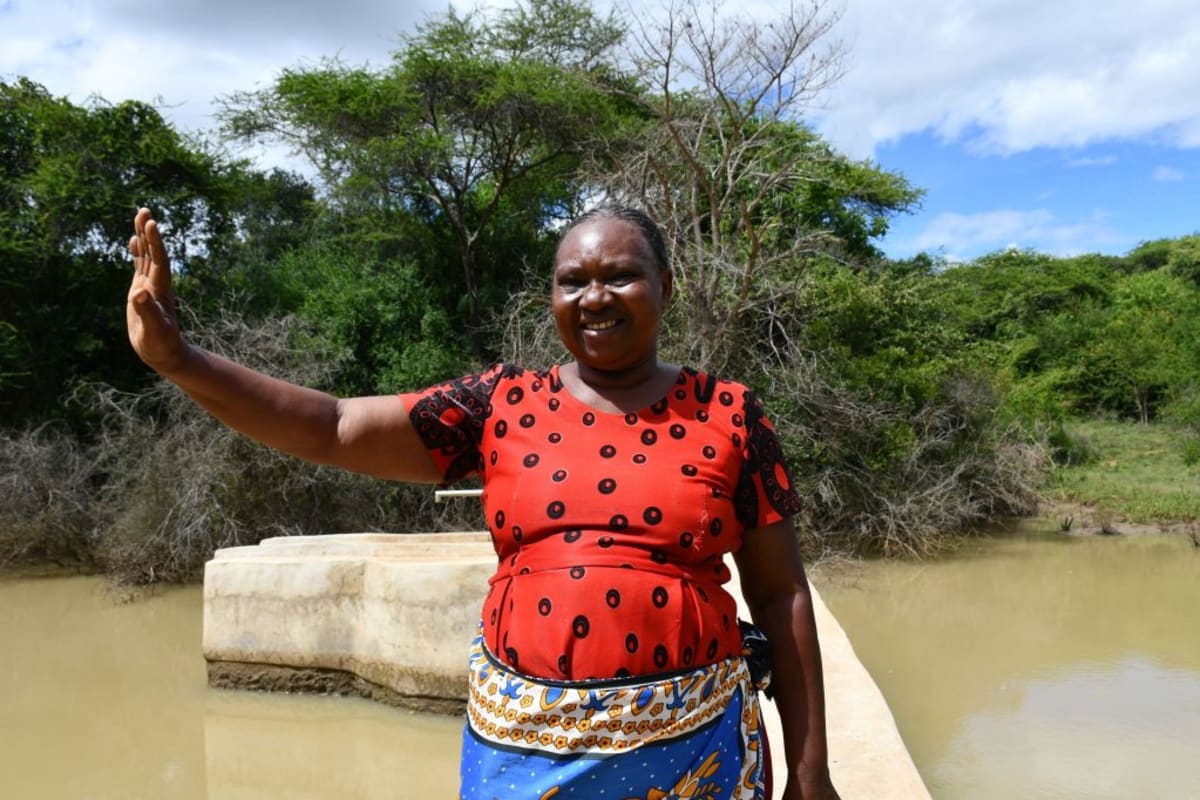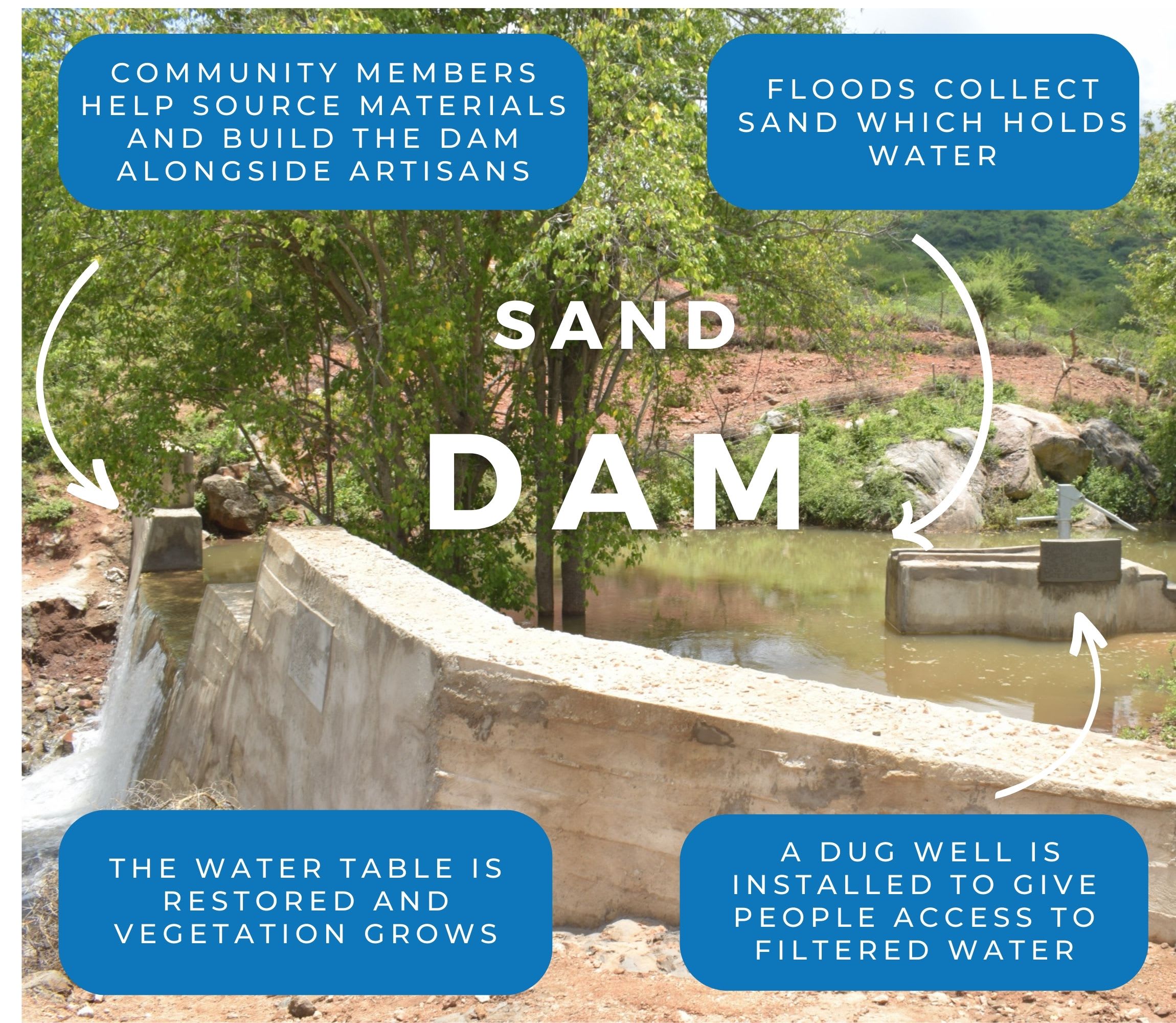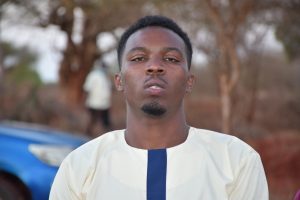Kavililu is tucked in a rural, semi-arid area of Kenya with little rain, so its 250 community members struggle to access sufficient water. They do not have their own water source, causing them to spend extraordinary amounts of physical effort to collect water from another community.
The faraway dug well does not produce sufficient water to satisfy the needs of everyone accessing it. People must wait in long lines after traveling extensive and exhausting distances, which leads to frequent quarrels.

"The steep terrain makes the current water point difficult to access. It is also located 5 kilometers (over 3 miles) away for most individuals. [This] leaves them exhausted after walking under the scorching sun in the area. Women have to wake up as early as 5:00 am to fetch water and return home in the afternoon. This consumes most of their time and energy; thus, [they] cannot fully participate in household chores, hygiene, herding livestock, or preparing their lands," shared field officer Alex Koech.
35-year-old community member Rhoda Kivya, seen collecting water below, agreed, "Tending to my children is already difficult, but I have to bear [the] burden and fetch water for drinking and preparing their meals. I get tired from walking to the river and coming back home, and most times, I am too exhausted to conduct household chores, let alone farming or preparing [the] land."

"Although I keep a kitchen garden, irrigating it is difficult because water is used sparingly. I cannot also take my goats to the water point because they could mix up with the other goats from neighbors and get lost; thus, they have to drink water that remains from washing or cleaning clothes. My life would be much easier if we had a nearby waterpoint which offers clean and sufficient water," concluded Rhoda.
"The school-going children spend most of their free time (evenings, weekends, and academic holidays) fetching water; thus, their studies and social life are negatively impacted," said Alex.
"I live with my grandmother, who is too old to fetch water from the distant dug well. Therefore I have to fetch water each evening and during weekends which is tiring and negatively affects my grades in school. Besides, I have [to] tend to other activities at home like cleaning and herding our goats and cattle. If we had a nearby waterpoint, fetching water would be easy. My grades would improve and enable admission to better tertiary schools, making my dream of being an engineer possible," said 16-year-old Francis K. (shown below).

But the distance to the water source is not the only issue. Unfortunately, after expending so much energy to collect water, people often suffer from water-related illnesses that steal more of their health and financial security.
"The dug well has a lid that is closed to prevent domestic animals and children from falling in. However, it is not protected enough to prevent water contamination because the water from the short rains enables dirt and feces to seep in. Most residents have been exposed to infections such as typhoid, amoeba, dysentery, and stomach upsets," said field officer Alex Koech.
Installing this water source will enable people like Rhoda and Francis to focus on completing essential tasks important for making progress instead of having all their time and energy consumed with finding and collecting water.
Helping to solve the water crisis in this community will take a multi-faceted system. It requires the collaboration of the sand dam and a hand-dug well. They will work together to create a sustainable water source that will serve this community for years to come.
The Proposed Solution, Determined Together...
At The Water Project, everyone has a part in conversations and solutions. We operate in transparency, believing it benefits everyone. We expect reliability from one another as well as our water solutions. Everyone involved makes this possible through hard work and dedication.
In a joint discovery process, community members determine their most advantageous water solution alongside our technical experts. Read more specifics about this solution on the What We're Building tab of this project page. Then, community members lend their support by collecting needed construction materials (sometimes for months ahead of time!), providing labor alongside our artisans, sheltering and feeding the builders, and supplying additional resources.
Water Access for Everyone
This water project is one piece in a large puzzle. In Kenya, Sierra Leone, and Uganda, we're working toward complete coverage of reliable, maintained water sources that guarantee public access now and in the future within a 30-minute round trip for each community, household, school, and health center. One day, we hope to report that this has been achieved!
Training on Health, Hygiene & More
With the community's input, we've identified topics where training will increase positive health outcomes at personal, household, and community levels. We'll coordinate with them to find the best training date. Some examples of what we train communities on are:
- Improved hygiene, health, and sanitation habits
- Safe water handling, storage & treatment
- Disease prevention and proper handwashing
- Income-generation
- Community leadership, governance, & election of a water committee
- Operation and maintenance of the water point






 Sand Dam
Sand Dam
 Rehabilitation Project
Rehabilitation Project




























